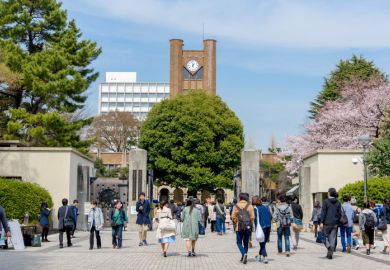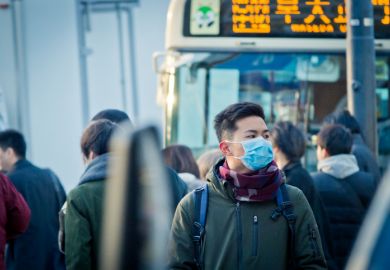Japan’s prime minister, Shinzo Abe, has responded to criticism of the nation’s entry ban on foreign residents, which some in higher education fear will hit internationalisation efforts, by announcing that restrictions will be loosened at a later date.
University leaders have said that the ban goes against the country’s stated goal of opening doors to global scholars. The nation is home to more than 300,000 international students and 8,000 foreign faculty.
Since April, only Japanese citizens have been able to re-enter the country freely, with some exceptions made on humanitarian grounds. Foreign residents currently abroad are blocked from returning, while those in Japan face a tough decision if they need to return to their birth country for personal reasons. Some critics have called the practice discriminatory because all entrants to Japan must equally undergo Covid-19 testing and 14 days of self-quarantine.
The Japanese Association of National Universities has sent a petition to the Education Ministry asking it to ease restrictions.
The foreign minister, Toshimitsu Motegi, was grilled on the issue during a 21 July press briefing, when a Radio France journalist said that barring residents who “pay tax, health insurance and rent” was “abnormal”. Mr Motegi replied that Japan would “consider” easing regulations “in phases”, with priority given first to businesspeople, then students, then general tourists.
Japan, which has recorded fewer than 1,000 Covid-19 deaths, has just announced travel advisories and planned entry bans on 17 more territories.
Carolin Funck, a vice-president at Hiroshima University, said at a 15 July videoconference that her university had “many new professors”, two current professors and more than 100 current and new students unable to access campus because of the ban, as well as 91 international students who have opted for postponement. She predicted that, if unresolved, the situation would get worse in the autumn, when the country normally sees more international students arrive.
“We are very much affected by this problem,” Professor Funck said. Students stuck overseas might not be able to finish the research or classwork needed to graduate, while still paying rent on Japanese apartments they cannot access. “Some may give up studying in Japan,” she said.
Hiroshima University has pushed internationalisation in recent years, doubling its number of foreign professors between 2013 and 2020. “Universities are really at the vanguard of creating an internationally open society,” Professor Funck said.
Futao Huang, a professor at Hiroshima University’s Research Institute for Higher Education, who is originally from China, told Times Higher Education that the rules would have relatively less impact on foreign professors already in Japan because the government had communicated Covid-19 strategies to institutions as early as February.
However, he said, the rules “especially affected newly recruited foreign professors or students who have not come to Japan”.
Rochelle Kopp, an American management consultant who teaches at The University of Kitakyushu and has written more than 30 books in Japanese, told THE that she had “no idea” when she would be able to go home to the US, for fear that she would be unable to re-enter Japan if she did.
“The ban definitely has implications for higher education,” she said. “I do think that it is going to cause some people to think twice. It’s also possible that some academics currently here will decide to leave as a result of the situation.
“It undermines Japan’s stated goals of internationalising higher education, research and the workforce,” she added. “And, sadly, I don’t think that the government realises how damaging this is.”
Ms Kopp added that “many of these students are in terrible situations, and one can be assured that they will tell others that Japan is not someplace they should consider studying. It’s a big blow to Japan’s reputation.”
While Japan is alone in the G7 on this issue, it is not the only Asian nation to make such a move. In March, mainland China banned all foreign residents from returning, a step that has affected professors and students who left over the Lunar New Year holiday.
However, there are signs that the region’s iron-clad border controls are cracking open. Taiwan has loosened rules on foreign students; overseas students and work-visa holders can now enter Singapore after applying for permission; and Hong Kong has been open to legal residents all along, albeit with testing and quarantine regulations.
Register to continue
Why register?
- Registration is free and only takes a moment
- Once registered, you can read 3 articles a month
- Sign up for our newsletter
Subscribe
Or subscribe for unlimited access to:
- Unlimited access to news, views, insights & reviews
- Digital editions
- Digital access to THE’s university and college rankings analysis
Already registered or a current subscriber?







